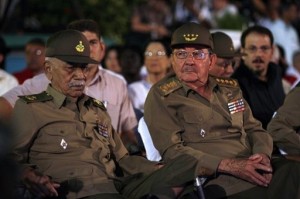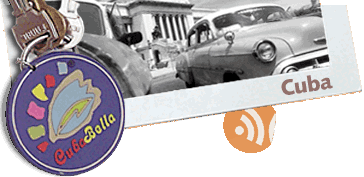Cuban vice president Juan Almeida dies
HAVANA – Cuban Vice President Juan Almeida Bosque, a revolutionary commander who fought alongside Fidel Castro to bring down a pro-American dictatorship, has died. He was 82.
An official communique issued through state media said Almeida, the number three official in the Americas’ only communist regime, died late Friday from cardiac arrest.
Almeida was one of just three top Cuban leaders to hold the title of revolutionary commander.
His death served as a reminder that Cuba’s old guard is not getting any younger. President Raul Castro is now 78, and Fidel Castro is five years his senior, Vice President Jose Ramon Machado, the regime’s number two, is also 78.
As a black man in racially diverse Cuba, Almeida was an important visual symbol of a break with the past, particularly in 1950s Cuba, where racism and discrimination were common. His close relationship with Castro for decades has been a sign of Afro-Cubans’ access to power and influence in communist Cuba.
Born on February 17, 1927 in Havana, Almeida took part in the 1953 assault on the Moncada barracks in Santiago de Cuba that historians cite as the starting point of the Cuban Revolution.
He participated in the Granma guerilla expedition and fought the rebel war in the Sierra Maestra Mountains against the government of Fulgencio Batista, a US-backed Cuban dictator.
A fine marksman, he was famous in official revolutionary history for shouting — when outnumbered in the first battle against Batista’s forces — “Nobody here is going to surrender!”
When revolutionary leaders came to power in 1959, he was promoted to general of Cuba’s Revolutionary Armed Forces and later became a member of the central committee and political bureau of the Cuban Communist Party.
He was also the third-ranking member of the Cuban Council of State.
Almeida, a bricklayer by trade who also was an accomplished music composer, was close to Fidel Castro, who led Cuba for almost five decades before stepping aside during a health crisis. Castro still leads the communist party.
“The name of Revolutionary Commander Juan Almeida Bosque will always remain in the hearts and minds of his countrymen as the finest example of revolutionary firmness, solid convictions, bravery, patriotism and commitment to the people,” the official statement said.
The government declared 12 hours of official mourning for Sunday.
“Well, this is the first of the high-ranking leadership to go; we have to get ready. The others will follow — time marches on,” said Maria Cruz, 54, a Havana housewife.
The “historic” leaders’ main political objective has been to sustain the regime and project it into the future.
Financial help from Venezuela has been critical on that front.
But politically, it is unclear who the party’s “new generation” pick will be to lead the majority of Cubans whose entire lives have been spent under revolutionary communist rule.
Efforts by other governments, including the neighboring United States, to press Cuba on political and economic opening have not borne much fruit.
Economically, the Raul Castro government has yet to launch substantive reforms. This week, it reversed a decade-long freeze on granting private taxi licenses, while oxen are widely used to drive plows in the crippled farm sector.
The US government has been encouraging Cuba to make progress on human rights issues.
It could well be a moot argument. The Cuban government denies that it has political prisoners and claims it is home to a democracy less corrupt than most.
Cubans earn an average of less than 20 dollars a month.




